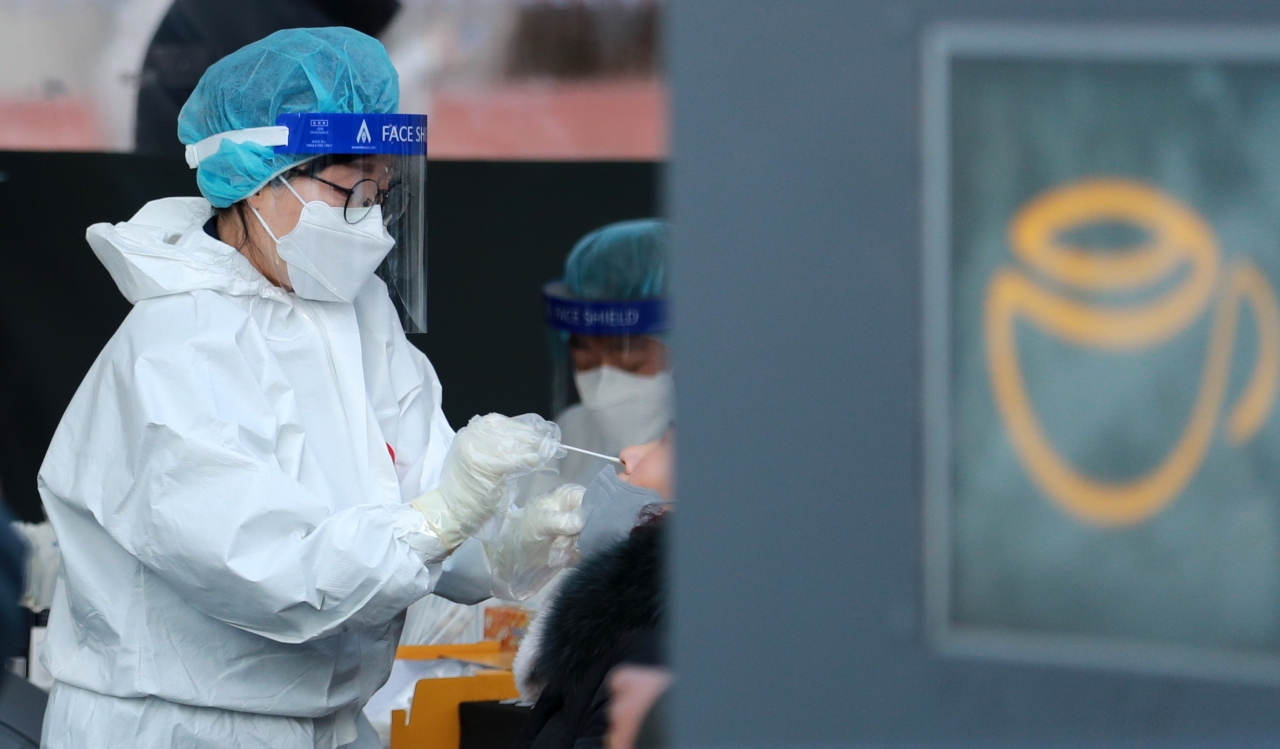 |
Health care worker takes a nasopharyngeal sample from a person at a testing center outside Seoul Station on Thursday morning. (Yonhap) |
Despite reassurances from health officials that hospitals are running smoothly, deaths continue to be reported in patients in South Korea before they get access to care.
Two more children died after they were initially told to recover at home, raising the cumulative death toll in under-10s to five, according to the Korea Disease Control and Prevention Agency’s latest updates.
In North Gyeongsang Province, a 7-year-old died Tuesday after spending two days at the hospital. She was diagnosed only four days prior to her death. Her initial symptoms were mild fever. She was moved to the hospital due to chest pains and other worsening symptoms. Medics suspect heart complications from COVID-19 as the cause of her death.
Also on Tuesday, a 4-month-old in Suwon, Gyeonggi Province, died just four days after he was confirmed with COVID-19. He died shortly after he was brought to the emergency room with cardiac arrest. He is the second child younger than a year old to die while in home isolation in Suwon in less than a week.
On Feb. 18, another Suwon infant, a 7-month-old, died after traveling to a hospital about 18 kilometers away in search of an available bed. His heart stopped beating while he was still in the ambulance, and was pronounced dead upon arrival.
As a COVID-19 vaccine for those aged 5-11 wasn’t cleared for use here until Wednesday, none of the pediatric deaths had been vaccinated. According to the official figures, over the latest seven-day period 1 in 3 new diagnoses were in children and adolescents 19 and under.
In Gangdong, eastern Seoul, two people found dead on the streets on Wednesday later tested positive in postmortem examinations.
One of them was a 53-year-old with a visual impairment, whom a passerby reported to the police. When first responders got to him he was already dead. Investigations revealed he was on his way to take a test after his parents in their 70s tested positive. Another was a woman in her 80s with Alzheimer’s. The first responders performed CPR but she was unresponsive. Both of them were triple vaccinated.
Meanwhile the government maintains that the ongoing omicron surge is the dark before the dawn.
President Moon Jae-in said in an online statement Wednesday those who are under 60 who have been boosted, omicron fatalities stand at zero. In a chiefs of staff meeting Monday, Moon said the peak of the omicron was near, and that it would bring Korea closer to getting normal life back.
Minister of Health and Welfare spokesperson Son Young-rae echoed the president’s statements during a briefing held the same day. The current omicron surge “can be viewed as a positive thing in the long run in order to restore normal life,” he said. “Omicron is less lethal than the seasonal flu in people who are fully vaccinated.”
He added that unlike during the delta wave, hospitals were far from becoming crowded.
As of Wednesday midnight, Korea saw a record high of 171,452 new cases, the highest daily case count anywhere in the world, according to the Ministry of Health and Welfare and Oxford University-generated Our World in Data. The number fell slightly to 170,016 on Thursday. In the past week, cases have averaged 121,887 per day.
So far, 7,689 people in Korea have lost their lives to COVID-19. An average of 64 people have died each day of the past week.
By Kim Arin (
arin@heraldcorp.com)




![[Herald Interview] 'Trump will use tariffs as first line of defense for American manufacturing'](http://res.heraldm.com/phpwas/restmb_idxmake.php?idx=644&simg=/content/image/2024/11/26/20241126050017_0.jpg)

![[Health and care] Getting cancer young: Why cancer isn’t just an older person’s battle](http://res.heraldm.com/phpwas/restmb_idxmake.php?idx=644&simg=/content/image/2024/11/26/20241126050043_0.jpg)

![[Graphic News] International marriages on rise in Korea](http://res.heraldm.com/phpwas/restmb_idxmake.php?idx=644&simg=/content/image/2024/11/25/20241125050091_0.gif)